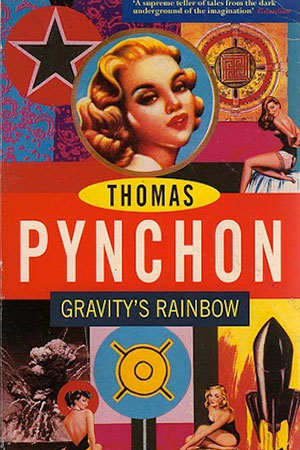It is too late. The Evacuation still proceeds, but it’s all theatre. There are no lights inside the cars. No light anywhere. Above him lift girders old as an iron queen, and glass somewhere far above that would let the light of day through. But it’s night. He’s afraid of the way the glass will fall—soon—it will be a spectacle: the fall of a crystal palace. But coming down in total blackout, without one glint of light, only great invisible crashing.
Inside the carriage, which is built on several levels, he sits in velveteen darkness, with nothing to smoke, feeling metal nearer and farther rub and connect, steam escaping in puffs, a vibration in the carriage’s frame, a poising, an uneasiness, all the others pressed in around, feeble ones, second sheep, all out of luck and time: drunks, old veterans still in shock from ordnance 20 years obsolete, hustlers in city clothes, derelicts, exhausted women with more children than it seems could belong to anyone, stacked about among the rest of the things to be carried out to salvation. Only the nearer faces are visible at all, and at that only as half-silvered images in a view finder, green-stained VIP faces remembered behind bulletproof windows speeding through the city. . . .
They have begun to move. They pass in line, out of the main station, out of downtown, and begin pushing into older and more desolate parts of the city. Is this the way out? Faces turn to the windows, but no one dares ask, not out loud. Rain comes down. No, this is not a disentanglement from, but a progressive knotting into—they go in under archways, secret entrances of rotted concrete that only looked like loops of an underpass . . . certain trestles of blackened wood have moved slowly by overhead, and the smells begun of coal from days far to the past, smells of naphtha winters, of Sundays when no traffic came through, of the coral-like and mysteriously vital growth, around the blind curves and out the lonely spurs, a sour smell of rolling-stock absence, of maturing rust, developing through those emptying days brilliant and deep, especially at dawn, with blue shadows to seal its passage, to try to bring events to Absolute Zero . . . and it is poorer the deeper they go . . . ruinous secret cities of poor, places whose names he has never heard . . . the walls break down, the roofs get fewer and so do the chances for light. The road, which ought to be opening out into a broader highway, instead has been getting narrower, more broken, cornering tighter and tighter until all at once, much too soon, they are under the final arch: brakes grab and spring terribly. It is a judgment from which there is no appeal.
